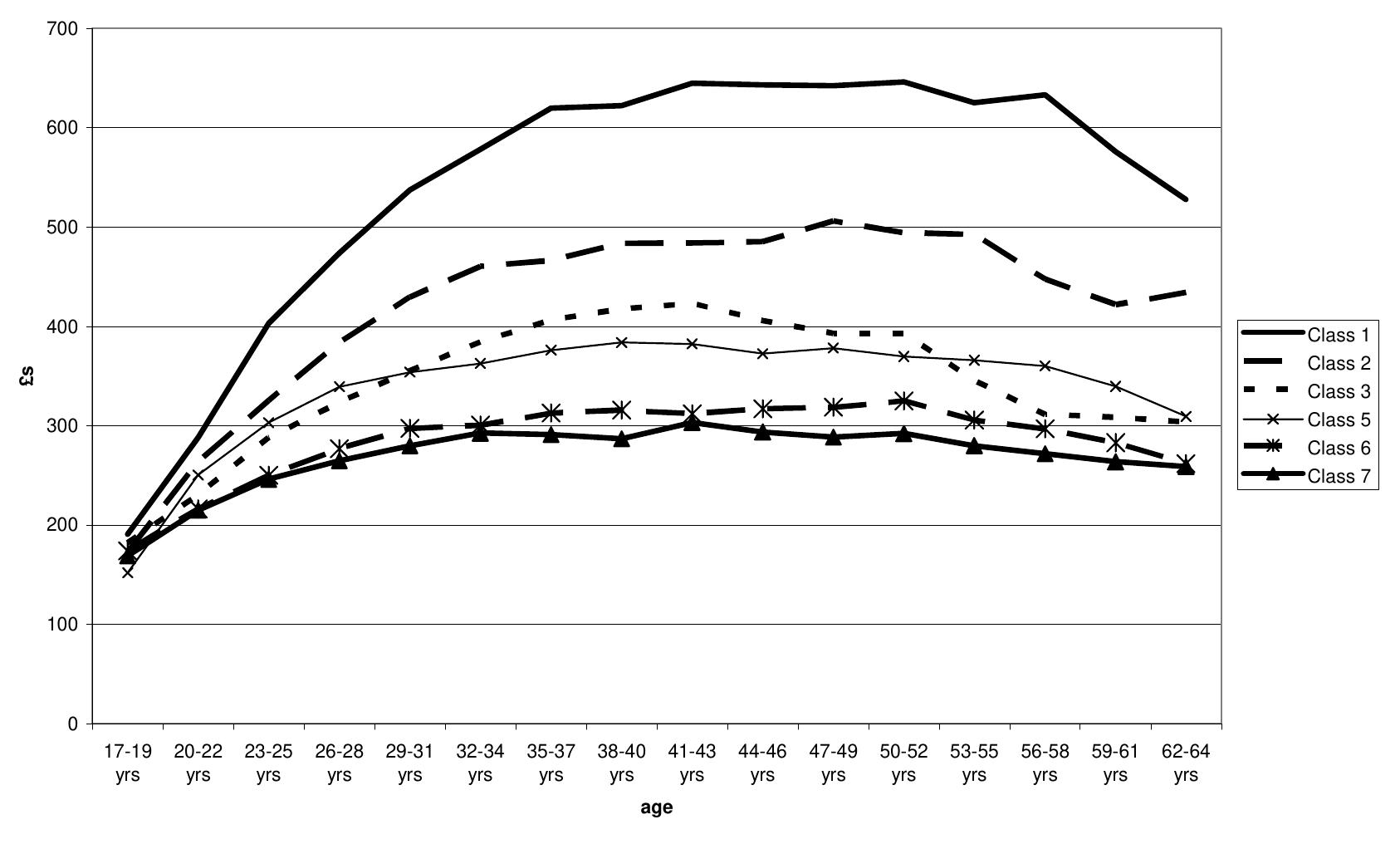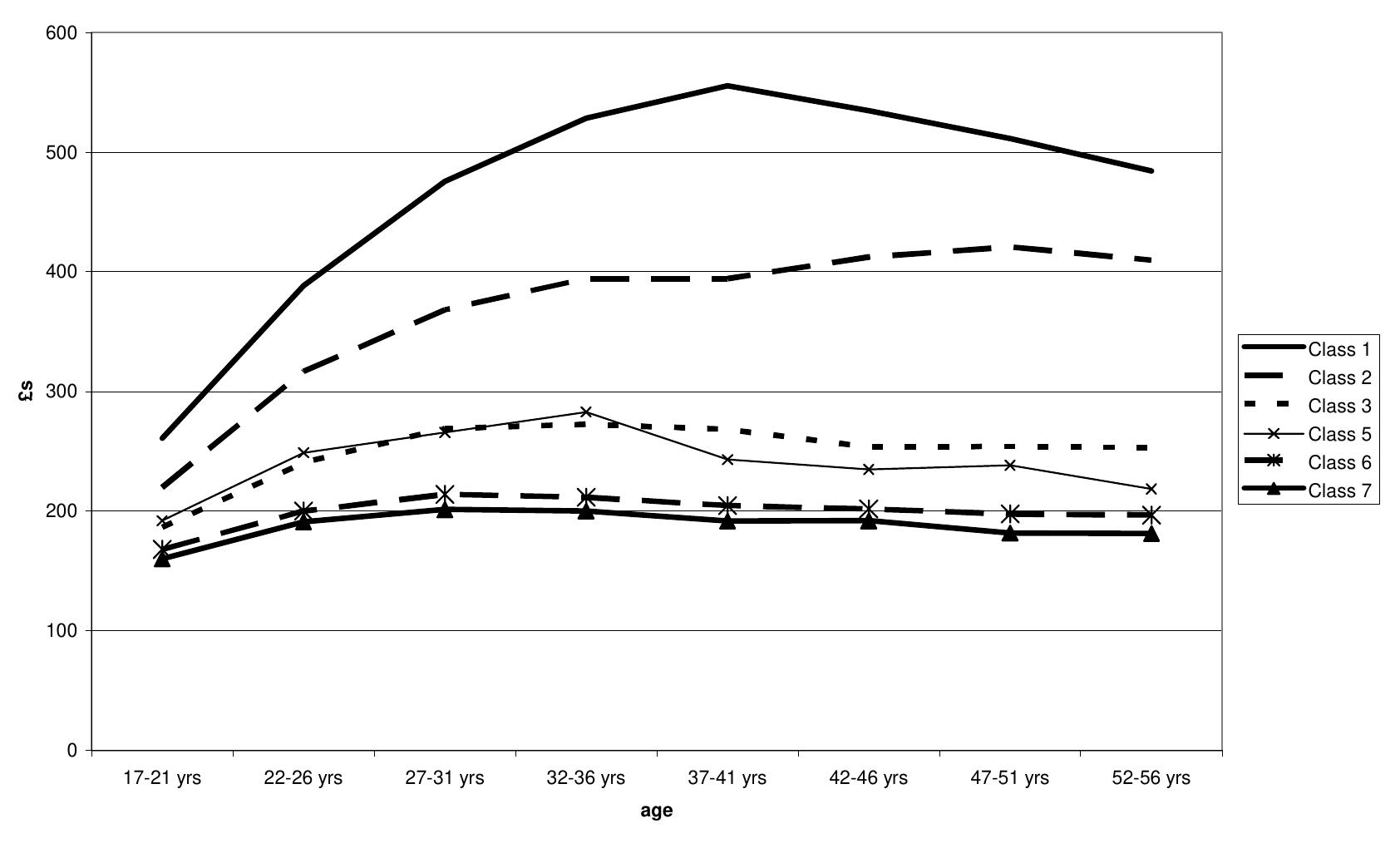The economic basis of social class (original) (raw)
2006, Mobility and Inequality: Frontiers of …
Abstract
All rights reserved. Short sections of text, not to exceed two paragraphs, may be quoted without explicit permission provided that full credit, including notice, is given to the source.
Figures (8)
Table 1: Correspondence of the Classes of the Goldthorpe Schema and of the NS-SEC Socio-Economic Classification and Common Descriptive Terms
Notes:
Figure 3: Men in full time employment in 1975 — median gross weekly earnings in 1999 prices
In Figure 4 corresponding results to those of Figure 3 are shown for 1999. It is apparent (note the changed vertical scale) that real earnings have increased and also that class inequalities have at the same time widened — as one would expect to find in the light of other analyses of earnings over the period covered (e.g. Gosling, Machin and Meghir, 1994; Johnson and Makepeace, 1997). However, of chief concern here is what has happened to the shape of the class curves. Figure 4: Men in full time employment in 1999 — median gross weekly earnings in 1999 prices
Figure 5: Women in full time employment in 1975 — median gross weekly earnings in 1999 prices
However, if Figure 5 is then compared with Figure 6, it is apparent that by 1999 not only had class inequalities in earnings widened among women, as among men, but that at the same time greater differences in the shapes of class curves had developed. And in turn the comparison of Figure 6 with Figure 4 ther serves to show that this differentiation is for the most part on similar lines tc that found among men. In particular, there is now the same marked contrast between the working class and the salariat: i.e. between, on the one hand, the curves for Classes 6 and 7 that remain largely flat after the 20s and, on the other, the curve for Class 1 that now rises steeply up to around age 40 and that for Class 2 that shows a slower though apparently more sustained rise. Figure 6: Women in full time employment in 1999 — median gross weekly earnings in 1999 prices
That the earnings of members of Class IV would thus appear as being, at best, only at the same level as those of primarily manual wage-workers suggests some significant degree of under-reporting, as indeed has been found in studies that have focused on this issue (cf. Meager and Bates, 2001); and any reasonable correction made in the light of these studies would in fact lead to Class IV earnings being placed somewhere in-between those for Class 5 and Class 6 for all except the youngest and oldest age groups.” However, for present purposes, it is the general shape of the curve of Figure 7 that is of chief significance. While this shows a rate of increase over younger age-groups similar to that for intermediate white-collar employees or even the lower salariat, it is more distinctive in the rate and extent of its subsequent decline. Selection effects are very likely to be involved here. The probability of self- employment in relation to age has been shown to be non-linear, first rising then falling in later life (Rees and Shah, 1986), and self-employed craftsmen in particular would seem inclined to opt for wage work as middle age approaches (Scase and Goffee, 1982: ch. 4). But what is more generally reflected, one may suppose, is a tendency for older independents, whether out of choice or constraint, to take on less business and to work shorter hours than they did when of prime age: that is to say, either because they can afford to enjoy more leisure or because of diminishing powers. In this respect, both the advantages and disadvantages of the economic position of independents are well brought out.

Loading Preview
Sorry, preview is currently unavailable. You can download the paper by clicking the button above.
References (46)
- Atkinson, A.B., Micklewright, J. and Stern, N.H. (1988). 'A Comparison of the Family Expenditure Survey and the New Earnings Survey 1971-1977' in A.B. Atkinson and H. Sutherland (eds.), Tax-Benefit Models, STICERD Occasional Paper 10, London School of Economics.
- Beck, U. (2000). What is Globalization?. Cambridge: Polity Press.
- Bernadi, F., Layte, R., Schizzerotto, A. and Jacobs, S. (2000). 'Who Exits Unemployment? Institutional Features, Individual Characteristics and Chance of Getting a Job' in D. Gallie and S. Paugam (eds.), Welfare Regimes and the Experience of Unemployment. Oxford: Oxford University Press.
- Boden R. and Corden, A. (1994). Measuring Low Incomes: Self-Employment and Family Credit. London: HMSO.
- Boudon, R. (2003). 'Beyond Rational Choice Theory'. Annual Review of Sociology, 29: 1-21.
- Bowles, S and Gintis, H. (2002). 'The Inheritance of Inequality'. Journal of Economic Perspectives, 16: 3-30.
- Breen, R. (2001). A Rational Choice Model of Educational Inequality. Istituto Juan March, Madrid. Working Paper 2001/166.
- Brown, P (1995). 'Cultural Capital and Social Exclusion: Some Observations on Recent Trends in Education, Employment and the Labour Market'. Work, Employment and Society, 9: 29-51.
- Castells, M. (1996/2000). The Rise of the Network Society. Oxford: Blackwells.
- Eggertsson, T. (1990). Economic Behaviour and Institutions. Cambridge: Cambridge University Press.
- Elias, P and Gregory, M. (1994). The Changing Structure of Occupations and Earnings in Great Britain, 1975-1990. Sheffield: Department of Employment Research Series, no. 27.
- Elias, P. and McKnight, A. (2003). 'Earnings, Unemployment and the NS-SEC' in D. Rose and D. Pevalin (eds.) A Researcher's Guide to the National Statistics Socio-economic Classification. London: Sage.
- Erikson, R. and Goldthorpe. J.H. (1992). The Constant Flux: A Study of Class Mobility in Industrial Societies. Oxford: Clarendon Press.
- Esping-Andersen, G. (1993). 'Introduction' in idem (ed.) Changing Classes: Stratification and Mobility in Post-Industrial Societies. Sage: London.
- Gallie, D., White, M., Cheng, Y. and Tomlinson, M. (1998). Restructuring the Employment Relationship. Oxford: Oxford University Press.
- Gershuny, J. (1993). 'Post-Industrial Career Structures in Britain' in G. Esping- Andersen (ed.), Changing Classes: Stratification and Mobility in Post- Industrial Societies. London: Sage.
- Gibbons, R. (1997). 'Incentives and Careers in Organisations' in D.M. Kreps and K.F. Wallis (eds.), Advances in Economics and Econometrics: Theory and Application. Cambridge: Cambridge University Press.
- Goldthorpe, J.H. (1987). Social Mobility and Class Structure in Modern Britain (2nd. ed.). Oxford: Clarendon Press.
- Goldthorpe, J.H. (1997).'The "Goldthorpe" class schema: Some observations on conceptual and operational issues in relation to the ESRC Review of Government Social Classifications', in D. Rose and K. O'Reilly (eds.), Constructing Classes: Towards a new social classification for the UK. London: Office for National Statistics.
- Goldthorpe, J.H. (2000a). 'Globalisation and social class', West European Politics, 25: 1-28.
- Goldthorpe, J.H. (2000b). On Sociology: Numbers, Narratives and the Integration of Research and Theory. Oxford: Oxford University Press.
- Gosling, A., Machin, S. and Meghir, C. (1994). 'What Has Happened to Men's Wages Since the Mid-1960s?' Fiscal Studies, 15: 63-87.
- Gray, J. (1998). False Dawn: The Delusions of Global Capitalism. London: Granta.
- Holmström, B. and Milgrom, P. (1991). 'Multitask Principal-Agent Analyses: Incentive Contracts, Asset Ownership and Job Design'. Journal of Law, Economics and Organisation, 7: 25-51.
- Johnson, D. and Makepeace, G.H. (1997). 'Occupational Advantage in the Eighties: An Analysis of the Lifetime Earnings of Men'. Work, Employment and Society, 11: 401-11.
- Johnson, P. (1985). Saving and Spending: The Working-Class Economy in Britain 1870-1939. Oxford: Clarendon Press.
- Jonsson, J.O. and Erikson, R. (2000). 'Understanding educational inequality', L'année sociologique, 50: 345-82.
- McGinnity, F. and Hellmert, S. (2002). Social Class, Labour Market Risks and Institutions: Unemployment across Cohorts and through the Life-Course in Britain and Germany. ISA Research Committee 28, Oxford.
- Meager, N., Court, G. and Moralee, J (1996). 'Self-Employment and the Distribution of Income' in J. Hills (ed.), New Inequalities: The Changing Distribution of Income and Wealth in the United Kingdom. Cambridge: Cambridge University Press.
- Meager, N. and Bates P. (2001). 'The Self-Employed and Lifetime Income'. International Journal of Sociology, 31: 27-58.
- Micklewright, J. and Trinder, C. (1981). New Earnings Surveys 1968-80: Sampling Methods and Non-Response. SSRC Taxation, Incentives and the Distribution of Income Programme, Working Paper 31.
- Milgrom, P. and Roberts, J. (1992). Economics, Organization and Management. London: Prentice Hall.
- Office for National Statistics (ONS) (1998). New Earnings Survey 1998, Part D: Analyses by Occupation. London: Office for National Statistics.
- ONS (2002). www.statistics.gov.uk/methods\_qality/ns\_sec/.
- Phelps Brown, H. (1977). The Inequality of Pay. Oxford: Oxford University Press.
- Rees, A. and Shah, A. (1986). 'An Empirical Analysis of Self-Employment in the U.K.'. Journal of Applied Econometrics, 1: 95-108.
- Rose, D. and O'Reilly, K. (eds.) (1997). Constructing Classes: Towards a New Social Classification for the U.K. London: Economic and Social Research Council and Office for National Statistics.
- Rose, D. and O'Reilly, K. (1998). The ESRC Review of Government Social Classifications. London: Economic and Social Research Council and Office for national Statistics.
- Rose, D. and Pevalin, D.J. (eds.) (2003). A Researcher's Guide to the National Statistics Socio-Economic Classification. London: Sage.
- Savage, M. (2000). Class Analysis and Social Transformation. Buckingham: Open University Press.
- Savage, M., Barlow, J., Dickens, P. and Fielding, T (1992). Property, Bureaucracy and Culture. London: Routledge.
- Scase, R. and Goffee, R. (1980). The Real World of the Small Business Owner. London: Croom Helm.
- Scase, R. and Goffee, R. (1982). The Entrepreneurial Middle Class. London: Croom Helm.
- Sørensen, A. B. (1991). 'On the Usefulness of Class Analysis in Research on Social Mobility and Socioeconomic Inequality'. Acta Sociologica, 34: 71- 87.
- White, M. (1983). Long-Term Unemployment and Labour Markets. London: Policy Studies institute.
- White, M. (1991). Against Unemployment. London: Policy Studies Institute.







